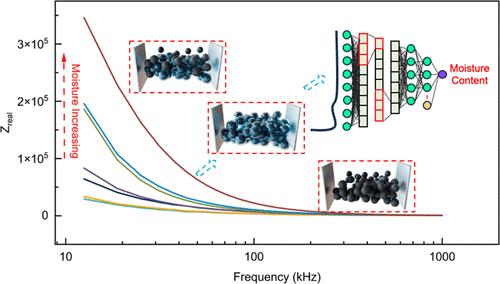Our official English website, www.x-mol.net, welcomes your
feedback! (Note: you will need to create a separate account there.)
Deep-Learning-Guided Electrochemical Impedance Spectroscopy for Calibration-Free Pharmaceutical Moisture Content Monitoring
ACS Sensors ( IF 8.2 ) Pub Date : 2024-08-03 , DOI: 10.1021/acssensors.4c01180 Guangshuai Han 1 , Brent Maranzano 2 , Christopher Welch 3 , Na Lu 1, 4 , Yining Feng 1, 4
ACS Sensors ( IF 8.2 ) Pub Date : 2024-08-03 , DOI: 10.1021/acssensors.4c01180 Guangshuai Han 1 , Brent Maranzano 2 , Christopher Welch 3 , Na Lu 1, 4 , Yining Feng 1, 4
Affiliation

|
The moisture content of pharmaceutical powders can significantly impact the physical and chemical properties of drug formulations, solubility, flowability, and stability. However, current technologies for measuring moisture content in pharmaceutical materials require extensive calibration processes, leading to poor consistency and a lack of speed. To address this challenge, this study explores the feasibility of using impedance spectroscopy to enable accurate, rapid testing of moisture content of pharmaceutical materials with minimal to zero calibration. By utilizing electrochemical impedance spectroscopy (EIS) signals, we identify a strong correlation between the electrical properties of the materials and varying moisture contents in pharmaceutical samples. Equivalent circuit modeling is employed to unravel the underlying mechanism, providing valuable insights into the sensitivity of impedance spectroscopy to moisture content variations. Furthermore, the study incorporates deep learning techniques utilizing a 1D convolutional neural network (1DCNN) model to effectively process the complex spectroscopy data. The proposed model achieved a notable predictive accuracy with an average error of just 0.69% in moisture content estimation. This method serves as a pioneering study in using deep learning to provide a reliable solution for real-time moisture content monitoring, with potential applications extending from pharmaceuticals to the food, energy, environmental, and healthcare sectors.
中文翻译:

用于免校准药物水分含量监测的深度学习引导电化学阻抗谱
药粉的水分含量会显着影响药物制剂的物理和化学性质、溶解度、流动性和稳定性。然而,当前测量药物材料水分含量的技术需要大量的校准过程,导致一致性差且缺乏速度。为了应对这一挑战,本研究探讨了使用阻抗谱以最小至零校准来准确、快速测试药物材料水分含量的可行性。通过利用电化学阻抗谱 (EIS) 信号,我们发现材料的电性能与药物样品中不同的水分含量之间存在很强的相关性。采用等效电路建模来揭示潜在机制,为阻抗谱对水分含量变化的敏感性提供有价值的见解。此外,该研究还结合了深度学习技术,利用一维卷积神经网络 (1DCNN) 模型来有效处理复杂的光谱数据。所提出的模型具有显着的预测精度,水分含量估计的平均误差仅为 0.69%。该方法是利用深度学习为实时水分含量监测提供可靠解决方案的开创性研究,潜在应用范围从制药到食品、能源、环境和医疗保健领域。
更新日期:2024-08-03
中文翻译:

用于免校准药物水分含量监测的深度学习引导电化学阻抗谱
药粉的水分含量会显着影响药物制剂的物理和化学性质、溶解度、流动性和稳定性。然而,当前测量药物材料水分含量的技术需要大量的校准过程,导致一致性差且缺乏速度。为了应对这一挑战,本研究探讨了使用阻抗谱以最小至零校准来准确、快速测试药物材料水分含量的可行性。通过利用电化学阻抗谱 (EIS) 信号,我们发现材料的电性能与药物样品中不同的水分含量之间存在很强的相关性。采用等效电路建模来揭示潜在机制,为阻抗谱对水分含量变化的敏感性提供有价值的见解。此外,该研究还结合了深度学习技术,利用一维卷积神经网络 (1DCNN) 模型来有效处理复杂的光谱数据。所提出的模型具有显着的预测精度,水分含量估计的平均误差仅为 0.69%。该方法是利用深度学习为实时水分含量监测提供可靠解决方案的开创性研究,潜在应用范围从制药到食品、能源、环境和医疗保健领域。































 京公网安备 11010802027423号
京公网安备 11010802027423号